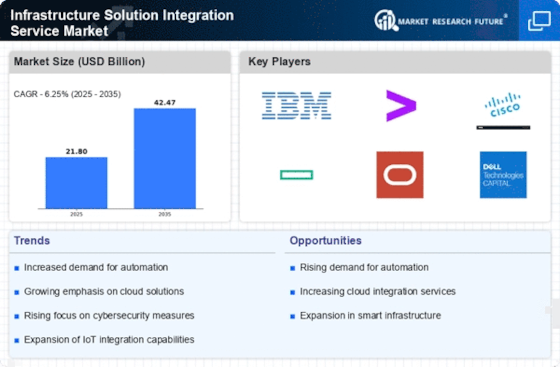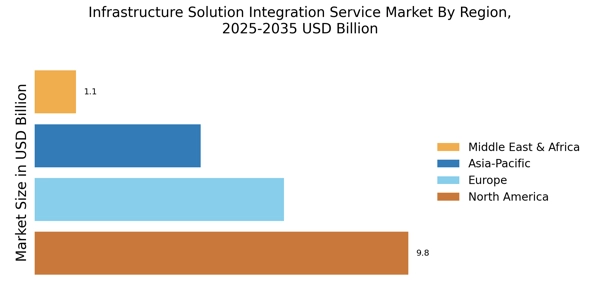Emergence of Hybrid IT Environments
The emergence of hybrid IT environments is reshaping the Infrastructure Solution Integration Service Market. Organizations are increasingly adopting a mix of on-premises and cloud-based solutions to optimize their IT strategies. This shift necessitates sophisticated integration services that can bridge the gap between different environments. Recent data indicates that nearly 80% of enterprises are expected to adopt hybrid cloud strategies by 2025, underscoring the need for effective integration solutions. Service providers in the Infrastructure Solution Integration Service Market are responding by developing tools and frameworks that facilitate seamless integration across hybrid environments, thereby enabling organizations to maximize their IT investments while maintaining flexibility and scalability.
Growing Importance of Data Analytics
The Infrastructure Solution Integration Service Market is significantly influenced by the growing importance of data analytics. Organizations are increasingly leveraging data-driven insights to inform decision-making processes, which necessitates the integration of various data sources. It is estimated that The Infrastructure Solution Integration Service Market will reach USD 274 billion by 2022, highlighting the critical role of integration services in enabling effective data utilization. Integration solutions facilitate the aggregation and analysis of data from multiple platforms, thereby empowering organizations to derive actionable insights. Consequently, service providers within the Infrastructure Solution Integration Service Market are focusing on developing advanced analytics capabilities that can seamlessly integrate with existing systems, enhancing overall business intelligence.
Rising Demand for Seamless Connectivity
The Infrastructure Solution Integration Service Market is experiencing a notable surge in demand for seamless connectivity solutions. As organizations increasingly rely on interconnected systems, the need for integration services that facilitate smooth communication between disparate platforms becomes paramount. This trend is underscored by the fact that approximately 70% of enterprises are prioritizing integration strategies to enhance operational efficiency. The ability to integrate various applications and data sources not only streamlines processes but also fosters innovation. Consequently, service providers in the Infrastructure Solution Integration Service Market are focusing on developing robust integration frameworks that can accommodate diverse technologies, thereby ensuring that businesses can adapt to evolving market conditions.
Increased Focus on Digital Transformation
Digital transformation remains a driving force within the Infrastructure Solution Integration Service Market. Organizations are increasingly recognizing the necessity of modernizing their IT infrastructure to remain competitive. According to recent studies, over 60% of companies have initiated digital transformation projects, which often necessitate comprehensive integration services. These services enable businesses to leverage new technologies, such as cloud computing and IoT, while ensuring that legacy systems remain functional. As a result, the Infrastructure Solution Integration Service Market is witnessing a proliferation of service offerings aimed at facilitating this transformation, thereby allowing organizations to enhance their agility and responsiveness to market demands.
Regulatory Compliance and Security Concerns
Regulatory compliance and security concerns are becoming increasingly prominent within the Infrastructure Solution Integration Service Market. As organizations navigate a complex landscape of regulations, the need for integration services that ensure compliance with data protection laws is paramount. Approximately 75% of businesses report that compliance is a top priority, driving demand for services that can integrate security measures into existing infrastructures. This trend is particularly evident in sectors such as finance and healthcare, where stringent regulations necessitate robust integration solutions. As a result, service providers are focusing on developing compliance-oriented integration frameworks that not only enhance security but also streamline the integration process, thereby addressing the dual challenges of compliance and operational efficiency.

















